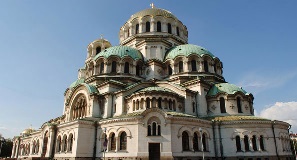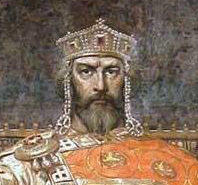 The Bulgarian Orthodox Church is the one of the oldest churches in the world, having been established in 927 AD. It has about 6.5 million members in Bulgaria and between 1.5 and 2.0 million members throughout Europe, America, and Australia. It is structured as a self-governing body, and consists of thirteen dioceses (“or eparchies”) within Bulgaria and two dioceses outside of Bulgaria. The church is in agreement with other Eastern Orthodox Churches on all major issues. It has about 1,500 priests and 120 monasteries in Bulgaria, with about 2000 monks and nearly 200 nuns. Over 85% of Bulgarians (about 6.5 million people) are considered to belong to the Orthodox Church.
The Bulgarian Orthodox Church is the one of the oldest churches in the world, having been established in 927 AD. It has about 6.5 million members in Bulgaria and between 1.5 and 2.0 million members throughout Europe, America, and Australia. It is structured as a self-governing body, and consists of thirteen dioceses (“or eparchies”) within Bulgaria and two dioceses outside of Bulgaria. The church is in agreement with other Eastern Orthodox Churches on all major issues. It has about 1,500 priests and 120 monasteries in Bulgaria, with about 2000 monks and nearly 200 nuns. Over 85% of Bulgarians (about 6.5 million people) are considered to belong to the Orthodox Church.
Eparchies (dioceses) in Bulgaria:
- Vidin
- Vratsa
- Lovech
- Veliko Tarnovo
- Dorostol
- Varna and Veliki Preslav
- Sliven
- Stara Zagora
- Plovdiv
- Sofia
- Nevrokop
- Pleven
- Ruse
Eparchies abroad:
- Central and Western Europe (Berlin);
- USA, Canada and Australia (New York)
History

Christianity came to Bulgaria early in the Christian era following the missionary journeys of the Apostle Paul in the first century, and by 300 AD it had become the dominant religion in the region. From the fifth century until the ninth century however, Christianity declined due to the migration of various barbaric tribes and incursions. In 864 AD Boris I (who adopted the Christian name Michael) restored Christianity to Bulgaria after his conversion, and Constantinople assigned an archbishop to the diocese. In 893, he replaced the Greek clergy with Bulgarians and replaced the Greek language with the Bulgarian language. In 927 AD Boris’ son Simeon fulfilled his quest for independence
Bulgaria came under Byzantine domination in the 11th century, and Emperor Basil II Bulgaroktonus established the boundaries of the eparchies. Shortly afterward the archbishops were all Byzantine, although the monks and the ordinary priests were predominantly Bulgarian.
Ottoman rule
When the Ottomans conquered Bulgaria in the 14th century the church was forced to endure its most difficult period under Muslim rule. Many of the clergy were martyred by the Muslim Ottomans and their churches were destroyed, and some of the remaining ones became mosques. Eventually the church began to revert back to the use of the Greek language and Greek clergy due to a resurgence of Greek nationalism. This combination of Muslim political oppression and Greek influence on the culture threatened the survival of the Bulgarian language and culture. The church’s monasteries managed to preserve them however, and in the mid-19th century Bulgarian clergy began a movement to remove the Greek clergy. This was accomplished by 1870, and by 1878 Bulgaria was freed from Ottoman rule.
Under the Communist rule of the Soviet Union from 1944–1989 the church was oppressed, yet preserved. Bishops were imprisoned and killed. Eventually only clergy loyal to the state were allowed. Since the collapse of the Soviet Union the church has seen its cultural and spiritual identity restored.

